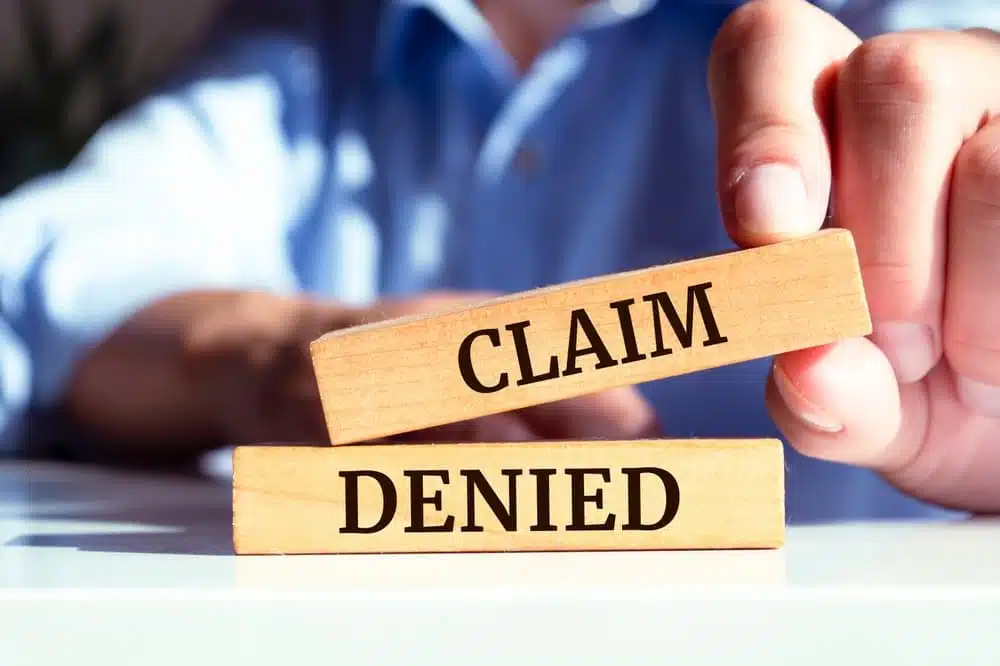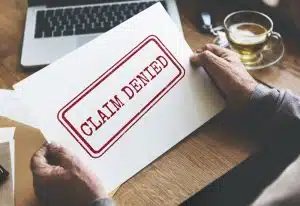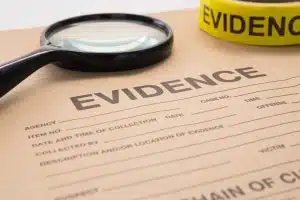
A denied insurance claim after a car accident doesn’t mean you’re out of options. There are legal steps you can take and, in many cases, denials can be appealed and possibly overturned.
Claim denials can happen for a variety of reasons, from missing paperwork to questions about coverage or liability. The important thing to know is that you have the right to challenge the decision. At The Rothenberg Law Firm, we’ve spent more than 50 years helping individuals take the right steps after a denial and recover the compensation they’re entitled to. Our attorneys understand the process and are here to guide you through every stage.
Key Takeaways
- Insurance denials happen for many reasons, including documentation gaps, coverage disputes, and liability questions – understanding the specific reason helps you build a stronger appeal.
- State laws protect your right to appeal with specific timelines: New York typically allows 60 days, New Jersey requires insurer response within 30 days, and Pennsylvania mandates a two-level appeal process.
- Strong evidence makes the difference in appeals – gather police reports, medical records, photographs, witness statements, and maintain organized documentation of all accident-related expenses.
- Insurance bad faith creates additional legal remedies beyond your original claim, potentially including punitive damages, attorney fees, and interest when companies violate fair claim handling requirements.
- Professional legal representation helps navigate complex denials, especially when facing policy interpretation disputes, significant damages, or multiple insurance companies.
Why Would an Insurance Company Deny a Car Accident Claim?

When reviewing accident claims, insurance companies often cite specific reasons for denials:
- Disputed liability where the insurance company questions who caused the accident
- Late claim filing that exceeds policy notification deadlines
- Pre-existing damage claims where insurers argue injuries existed before the crash
- Policy exclusions for specific situations, like racing or commercial use
- Insufficient evidence supporting your damages or injuries
- Policy lapses or payment issues can create automatic denials
- Coverage disputes, like exclusions or limitations
Each denial reason requires different strategies to overcome. Documentation gaps might need additional medical records or witness statements, while coverage disputes require careful policy interpretation and legal arguments about applicable provisions. Our attorneys review your claim, policy, and the denial letter to determine what options are available and create a strategy to move forward.
Appeal Process for Denied Auto Insurance Claims
Every denied auto insurance claim includes appeal rights protected by state law. Understanding these formal procedures helps you navigate the process effectively and present your strongest case for reconsideration.
Your first step involves carefully reviewing the denial letter. Insurance companies must explain their denial reasons in writing, citing specific policy provisions or evidence issues. This explanation provides your roadmap for building a successful appeal.
State-Specific Appeal Requirements
| State | Internal Appeal Timeline | External Review Options | Key Requirements | State Resources |
| New York | 60 days typical (varies by policy) | External Review through DFS for medical necessity, experimental treatment, and out-of-network disputes | Written notice “as soon as reasonably possible” per Insurance Law Section 3420; must cite specific policy provisions | Department of Financial Services provides an independent review; Decisions are binding on insurers |
| New Jersey | 10 days acknowledgment; 30 days decision (72 hours for urgent) | Independent Health Care Appeals Program for certain denials | Different personnel must handle appeals than the initial denial; a written acknowledgment is required | Department of Banking and Insurance Office of Insurance Ombudsman mediates disputes |
| Pennsylvania | Level 1: 30 days; Level 2: 60 days | Consumer Services Bureau investigates and mediates disputes | Two-level process required; appeal reviewers must have equal/higher authority than the initial decision-maker | Insurance Department allows concurrent bad faith claims during appeals |
Most policies require written appeals within specific timeframes. Missing these deadlines could forfeit your right to appeal, making prompt action essential. The Rothenberg Law Firm helps clients meet these critical deadlines while building comprehensive appeal packages tailored to each state’s requirements.
Gathering Evidence to Support Your Appeal

Building a comprehensive appeal requires gathering evidence from multiple sources. Examples of helpful include the following:
- Police reports providing official accident documentation
- Photographs showing vehicle damage, road conditions, and injury severity
- Witness statements from passengers or bystanders who observed the crash
- Expert opinions from accident reconstructionists or medical specialists
- Employment records documenting lost wages and work limitations
- Medical records from healthcare providers treating your injuries
Organizing this evidence effectively matters as much as gathering it. Create clear timelines showing how your injuries developed and affected your daily life, and a clear connection between your accident and claimed injuries.
Understanding Your Rights After Claim Denial
State laws provide specific protections when insurance companies deny legitimate claims. These regulations limit how insurers handle claims and establish penalties for improper denials.
You maintain the right to receive all claim-related documents. Insurance companies must provide copies of investigations, expert reports, and internal communications about your claim upon request. This transparency requirement helps identify potential bad faith practices.
New York Insurance Claim Rights
New York maintains strict regulations protecting accident victims from unfair insurance practices. Under New York’s Regulation 64, insurers must acknowledge claims within 15 business days and decide coverage within 15 business days after receiving necessary documentation. The state’s unfair claims settlement practices act prohibits insurers from misrepresenting policy provisions or failing to attempt good faith settlements.
New York’s statute of limitations provides three years from the accident date to file personal injury lawsuits. However, claims against government entities require filing a notice of claim within 90 days. These shorter deadlines make immediate legal consultation crucial after denials involving municipal vehicles or property.
New Jersey Insurance Claim Rights
New Jersey’s Unfair Claims Settlement Practices Act requires insurers to acknowledge communications about claims within 10 working days. Insurance companies must advise claimants of acceptance or denial within a reasonable time after completing investigations. The state specifically prohibits compelling insureds to institute litigation by offering substantially less than the amounts ultimately recovered.
New Jersey provides a two-year statute of limitations for personal injury claims arising from car accidents. The state’s insurance regulations also require insurers to maintain complaint procedures and inform claimants about the Department of Banking and Insurance’s assistance programs.
Pennsylvania Insurance Claim Rights
Pennsylvania enforces the Unfair Insurance Practices Act, requiring prompt, fair claim handling. Insurers must acknowledge claim communications within 10 working days and complete investigations within 30 days unless circumstances warrant extensions. The state mandates that insurers provide written explanations for claim denials, including specific policy provisions supporting their decisions.
Pennsylvania’s statute of limitations allows two years from the accident date for filing personal injury lawsuits. The state’s bad faith statute permits recovery of interest, punitive damages, and attorney fees when insurers act in bad faith, providing powerful remedies for improper denials.
Understanding these state-specific requirements helps identify violations supporting your appeal. The Rothenberg Law Firm’s attorneys know these regulations thoroughly, using them to protect clients’ rights throughout New York, New Jersey, and Pennsylvania.
When to Consider Legal Representation

Several situations indicate a strong need for legal help with denied insurance claims:
- Denials citing complex policy language or coverage interpretations
- Significant medical expenses or permanent injuries at stake
- Multiple insurance companies disputing liability or coverage
- Bad faith indicators like unreasonable delays or changing denial reasons
- Settlement offers far below actual damages
Legal representation becomes particularly valuable when facing sophisticated insurance company legal teams. Insurers employ experienced adjusters and attorneys, and leveling this playing field requires equally skilled advocacy.
Insurance Bad Faith: Recognizing Unfair Practices
Insurance companies owe policyholders and claimants duties of good faith and fair dealing. Violating these obligations through unreasonable claim handling creates bad faith liability beyond your original damages.
Common bad faith indicators include:
- Denying claims without conducting reasonable investigations
- Misrepresenting policy language or applicable law
- Refusing to provide claim file documents upon request
- Offering unreasonably low settlements without justification
- Failing to respond to communications within reasonable timeframes
Documenting bad faith behavior throughout your claim process preserves evidence for potential litigation. Keep detailed records of all interactions, including dates, times, and specific statements made by insurance representatives. Depending on your state, courts may award penalties, interest, and attorney fees when insurers act unreasonably.
Building a Strong Car Accident Claim Denial Appeal
Success in overturning denied claims requires methodical preparation and strategic thinking. Start documenting everything immediately after your accident, creating comprehensive records supporting your damages.
Strategic considerations for building strong cases include:
- Obtaining treating physician support for all claimed injuries and limitations
- Documenting every way injuries affect work, family, and daily activities
- Preserving physical evidence, like damaged clothing or vehicle parts
- Creating visual aids showing injury progression through photographs
- Maintaining consistent medical treatment, demonstrating injury severity
You will want to maintain organized files containing all accident-related documents. Include medical bills, repair estimates, correspondence with insurers, and records of all accident-related expenses. This organization simplifies evidence presentation during appeals or litigation.
Your testimony could provide crucial evidence about pain, suffering, and life impacts. Keep detailed journals describing daily pain levels, activity limitations, and emotional effects. Insurance companies may search for contradictions between medical records, social media posts, and claim statements.
Working with The Rothenberg Law Firm
Since 1969, The Rothenberg Law Firm has helped accident victims overcome insurance company denials. Our attorneys bring decades of experience challenging improper claim denials and securing fair compensation for clients.
We understand the frustration of receiving denial letters after suffering serious injuries. Our team reviews your case, identifying strategies for overturning denials and securing compensation. With billions recovered for clients collectively, we know what works.
Available 24/6, we provide immediate guidance when you need answers about denied claims. Early intervention can prevent costly mistakes that complicate appeals. Contact us before accepting denials as final or speaking with insurance representatives.
FAQs About Insurance Company Accident Claim Denials
What if the Other Driver’s Insurance Company Denies Liability Completely?
When another driver’s insurer denies liability, you may need to use your own collision or uninsured motorist coverage initially. Your insurance company then pursues reimbursement from the at-fault driver’s insurer through subrogation. This process protects you from claim delays while preserving your right to recover damages. The Rothenberg Law Firm helps coordinate these complex multi-insurer situations and determines a path forward.
How Long Do Insurance Companies Have to Respond to Appeals?
Response timeframes vary by state, though most require insurance companies to acknowledge appeals within 10-15 days and provide substantive responses within 30-45 days. Some states impose shorter deadlines for specific claim types. Tracking these deadlines helps identify potential bad faith delays, supporting additional damages claims.
What Damages Am I Entitled to if Bad Faith Is Proven?
Bad faith verdicts often include compensation beyond original accident damages. Courts may award emotional distress damages, penalty multipliers, attorney fees, and interest from the original claim date. Some states permit punitive damages designed to deter future bad faith conduct. These additional damages recognize the harm caused by improper claim handling.
Do I Need to Hire Accident Reconstruction Experts for My Appeal?
Expert testimony may strengthen appeals when liability remains disputed or complex accident dynamics require explanation. Accident reconstructionists analyze physical evidence, creating detailed reports about collision forces and causation. Not every appeal requires expert testimony, so it is important to speak with your lawyer about your denial and options.
What if I Already Cashed a Check from the Insurance Company?
Cashing insurance checks may limit future claims depending on the accompanying language. Some checks include “full and final settlement” notations creating binding agreements. Others represent partial payments, preserving remaining claims. Review all check language carefully before depositing, and consult attorneys about potential implications for your broader claim.
Taking Action After Your Claim Denial
Don’t accept insurance company denials as final determinations. You maintain important rights to challenge these decisions and pursue compensation. The key often lies in taking prompt, strategic action guided by experienced legal counsel.
If you received a denied car accident claim, contact The Rothenberg Law Firm at 1-800-624-8888. Our attorneys review your denial letter, evaluate your options, and develop strategies for appealing improper denials. With offices in New York, New Jersey, and Pennsylvania, plus nationwide representation available, we’re ready to fight for your rights.
Since 1969, we’ve helped thousands of accident victims navigate insurance disputes successfully. Let our experience work for you in challenging your denied auto insurance claim and securing the compensation you need to move forward after your accident.



